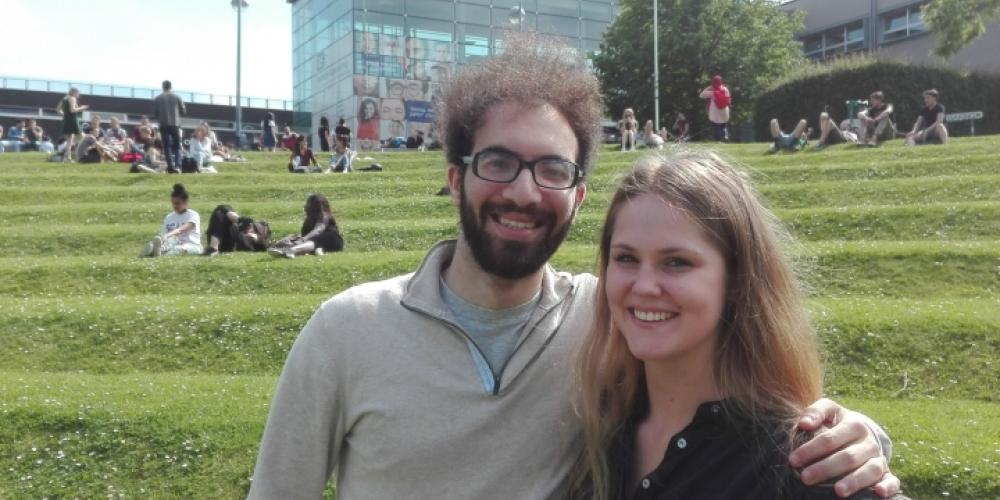
Sexual health and discrimination based on gender or sexual preferences are a global problem. Everywhere in the world there still is a long way to go. In this context UCOS launches their new campaign 'CHanGE': Campaign for sexual Health and Gender Equality’. This campaign will run until 2021 and exists of various public activities and exploratory travels to the South. This summer the first students leave for India, Uganda and Congo, searching for complex stories on this issue.
Mutual connectivity as well as an open approach to this context is crucial for UCOS. “CHanGE is not a unilateral story of the West judging a local problem, or forcing the 'good' example”, Jad explains with an determined voice. “The daily reality teaches the West to be modest on this topic. The project is not about stereotyping poor Africa or India. The CHanGE project approaches the global issue of sexual health and gender equality from a different perspective. We will investigate the core of the problem as well as the positive initiatives to turn the tide.”
Exploratory travels
UCOS has built a strong reputation regarding exploratory travel for students and lecturers over the past few years. For this project, they rely on the strong local networks of DeMens.nu, a partner in the project.
“The aim is to dive into the local situation during three weeks and to share our experiences with the VUB community in autumn”, Janne points out. “Based on our insights we will set up campaigns, reach out and communicate. We hope the VUB students will pick it up, which in turn could be an incentive for them to head South next summer."
For this first edition, 75 students applied. The ten other selected students come from UGent, KULeuven and Erasmushogeschool Brussel. This group will be the first generation of CHanGEmakers.
“It clearly is not a holiday trip”, Jad emphasises. “We travel to these countries to research and learn, to add our share. We do not know where we will finally end up, but we do know this experience will inspire us to initiate the CHanGE campaign over here.” “The essence is to look for inspiring stories and to understand how they globally connect”, Janne adds. “In this project real stories are more important than statistics.”
Popular theme
The theme of the campaign and exploratory travels was not chosen by accident. “Gender equality is a trending topic among youngsters”, Jad explains. “Look at how the campaign ‘I said no’ was adopted in a respectful way at VUB. Two weeks after the launch of the campaign the poster boards were still not covered by party posters. In addition, popular culture deals more and more with the topic. Take Béyonce for instance, to mention a popular icon. We can only be happy about that. It is not normal that in the 21st century certain actions, convictions or boundaries to personal growth as a woman or sexual minority still exist.”
Jad himself is an active member of VUBMUN, the VUB’s ‘model United Nations’. His focus on equal rights is easy to understand given his field of study. For Janne, who worked on this topic in Suriname, the project is a prolongation of her thesis, only set in a different intercultural context.
Uganda, Congo and India
The choice for the three countries - Uganda, Congo and India - is not accidental.
“In Uganda the regime of president Museveni uses homophobia as a distraction from the real political problems”, Jad explains. “At first sight the law in Uganda seems allright, but in daily life there still is a lot of sexual violence. For instance, all addresses of gay rights activists were published in the newspaper. Luckily youngsters, academics and activists protested strongly and were able to stop a very dubious law. That is the positive side of it.”
“In India the social position of women is still problematic”, Janne claims. “The country still has a patriarchal system, in which parents do not wish for a girl and in which daughters are forced to marry for a dowry. Recently some horrific stories appeared in the media, such as a gang rape on a bus. On the other hand, some Indian cultures are known for their special positioning of transgender people. Here too framing is a problem, but the transgender community is valued in a special way. They are given respected positions in festivities.”
“Congo deals with a problem of rough, sexual violence in war zones”, Jad explains. “The positive story here are the many aid initiatives in response to this, and the battle against the harassments. The work of gynaecologist and human rights activist Denis Mukwege on anticonception in East-Congo is pioneering.”
The true stories will come out this summer, when the students will investigate the situation on the spot as CHanGEmakers. Are you curious about their experiences? Please follow their stay in the social media of UCOS: www.facebook.com/ucosfanpage, www.instagram.com/ucos.be and on the website www.ucos.be.
Are you interested to be involved in this project? Do you have any experience with projects or organisations related to this theme? Please contact bram.cleys@ucos.be .